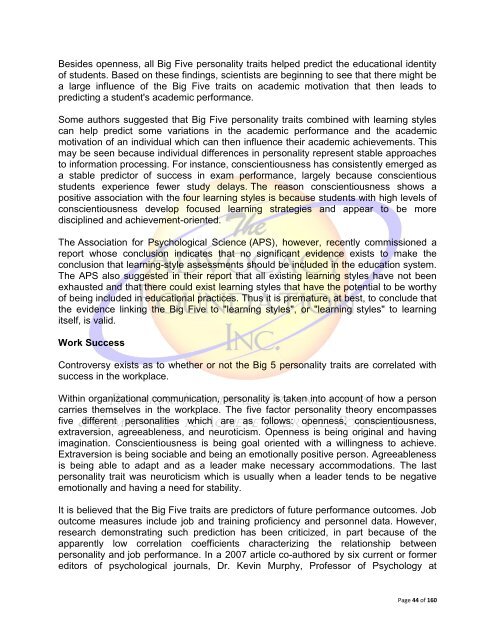The Gift of Introversion
The Gift of Introversion
The Gift of Introversion
Create successful ePaper yourself
Turn your PDF publications into a flip-book with our unique Google optimized e-Paper software.
Besides openness, all Big Five personality traits helped predict the educational identity<br />
<strong>of</strong> students. Based on these findings, scientists are beginning to see that there might be<br />
a large influence <strong>of</strong> the Big Five traits on academic motivation that then leads to<br />
predicting a student's academic performance.<br />
Some authors suggested that Big Five personality traits combined with learning styles<br />
can help predict some variations in the academic performance and the academic<br />
motivation <strong>of</strong> an individual which can then influence their academic achievements. This<br />
may be seen because individual differences in personality represent stable approaches<br />
to information processing. For instance, conscientiousness has consistently emerged as<br />
a stable predictor <strong>of</strong> success in exam performance, largely because conscientious<br />
students experience fewer study delays. <strong>The</strong> reason conscientiousness shows a<br />
positive association with the four learning styles is because students with high levels <strong>of</strong><br />
conscientiousness develop focused learning strategies and appear to be more<br />
disciplined and achievement-oriented.<br />
<strong>The</strong> Association for Psychological Science (APS), however, recently commissioned a<br />
report whose conclusion indicates that no significant evidence exists to make the<br />
conclusion that learning-style assessments should be included in the education system.<br />
<strong>The</strong> APS also suggested in their report that all existing learning styles have not been<br />
exhausted and that there could exist learning styles that have the potential to be worthy<br />
<strong>of</strong> being included in educational practices. Thus it is premature, at best, to conclude that<br />
the evidence linking the Big Five to "learning styles", or "learning styles" to learning<br />
itself, is valid.<br />
Work Success<br />
Controversy exists as to whether or not the Big 5 personality traits are correlated with<br />
success in the workplace.<br />
Within organizational communication, personality is taken into account <strong>of</strong> how a person<br />
carries themselves in the workplace. <strong>The</strong> five factor personality theory encompasses<br />
five different personalities which are as follows: openness, conscientiousness,<br />
extraversion, agreeableness, and neuroticism. Openness is being original and having<br />
imagination. Conscientiousness is being goal oriented with a willingness to achieve.<br />
Extraversion is being sociable and being an emotionally positive person. Agreeableness<br />
is being able to adapt and as a leader make necessary accommodations. <strong>The</strong> last<br />
personality trait was neuroticism which is usually when a leader tends to be negative<br />
emotionally and having a need for stability.<br />
It is believed that the Big Five traits are predictors <strong>of</strong> future performance outcomes. Job<br />
outcome measures include job and training pr<strong>of</strong>iciency and personnel data. However,<br />
research demonstrating such prediction has been criticized, in part because <strong>of</strong> the<br />
apparently low correlation coefficients characterizing the relationship between<br />
personality and job performance. In a 2007 article co-authored by six current or former<br />
editors <strong>of</strong> psychological journals, Dr. Kevin Murphy, Pr<strong>of</strong>essor <strong>of</strong> Psychology at<br />
Page 44 <strong>of</strong> 160

















